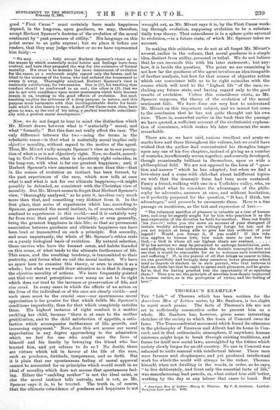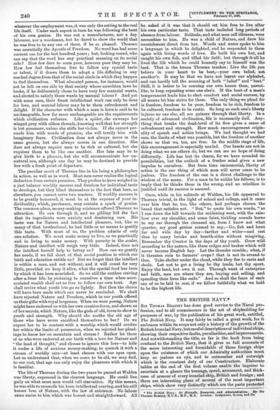THOREAU'S EXAMPLE.*
THE " Life " of Thoreau which has been written for the American Men of Letters series, by Mr. Sanborn, is too slight to merit much praise. The facts of Thoreau's life are not set in sufficiently consecutive order to present him as a whole. Mr. Sanborn has, however, given some interesting sketches of the society to which the town of Concord owes its fame. The Transcendental movement which found its utterance in the philosophy of Emerson and Allcott had its home in Con- cord, and in that enthusiastic atmosphere, if anywhere, human existence might hope to break through existing traditions, and frame for itself new social laws, unweighted by the fetters which society slowly forges for an old country. No one in Concord was ashamed to unite manual with intellectual labour. These men were farmers and shopkeepers, and yet produced intellectual work for which the world will always be the richer. Thoreau himself, when not dwelling in the woods, in order, as he says, " to live deliberately, and front only the essential facts of life," was manufacturing lead pencils, or, what suited him still better, working by the day at any labour that came to hand. But • American Men of Letter' : Henry D. Thoreau. By F. B. Sanborn. London; Sampson Low and Co. 1882.
whatever the employment was, it was only the setting to the real life itself. Under each aspect in turn he was following the bent of his own genius. He was not a manufacturer, nor a day labourer, nor a woodsman, but he dared to show the world that he was free to be any one of these, if he so pleased. Thoreau was essentially the Apostle of Freedom. No word has had more current use for the last hundred years ; but, looking round, who can say that the word has any practical meaning on its social side ? How few dare to seem poor, however poor they may be. How few feel themselves free to follow any special taste or talent, if it draws them to adopt a life differing in any marked degree from that of the social circle in which they happen to find themselves. What educated person, for instance, would not be left on one side by that society whose unwritten laws he broke, if he deliberately chose to have very few material wants, and elected to satisfy those wants by manual labour ? And yet with some men, their finest intellectual work can only be done for love, and manual labour may be to them refreshment and delight. If the character with which a man is born is said to be unchangeable, how far more unchangeable are the requirements which civilisation enforces. Like a spider, she enwraps her winged prey with silken threads, knowing well that her strength is but gossamer, unless she stifle her victim. If she cannot per- suade him with words of promise, she will terrify him with imaginary fears. Civilisation does not always move in the same groove, but she always moves in one direction. She does not always require men to be rich or cultured, but she requires them to be like one another. Her fate may be to give birth to a phcenix, but she will excommunicate her un- natural son, although one day he may be destined to provide her with a fresh point of departure.
The peculiar merit of Thoreau lies in his being a philosopher in action, as well as in word. Most men never realise the logical deduction from certain premises. They profess to have weighed in a just balance worldly success and freedom for individual taste to develope, but they blind themselves to the fact that here, as elsewhere, you cannot serve two masters. If worldly success is to be greatly honoured, it must be at the expense of your in- dividuality, which, perchance, may contain a spark of genius. The common-place, money-making existence offered Thoreau no attraction. He saw through it, and no gilding hid the fact that its ingredients were anxiety and deadening care. His taste was for Nature and intellectual pleasure, but, like so many of that brotherhood, he had little or no means to gratify this taste. With most of us, the problem admits of only one solution. We must make money to live, so we practically end in living to make money. With poverty in the .scales, Nature and intellect will weigh very little. Indeed, does not the intellect herself help to betray us ? How can we gratify her needs, if we fall short of that social position to which our birth and education entitle us ? But we forget that the intellect is within a man, and not without, and it will count for very little, provided we keep it alive, what the special food has been by which it has been nourished. So we still the restless craving after a freer life, by picturing to ourselves a time when accu- mulated wealth shall set us free to follow our own bent. Age shall revive what youth lets go so lightly. But then the choice will have been made which can never be rescinded. We shall have rejected Nature and Freedom, which in our youth offered us their gifts with royal largeness. When we were young, Nature might have endowed us with her own creative force, and shown us of her secrets, which Nature, like the gods of old, loves to show to youth and strength. Why should she soothe the old age of those who have never sacrificed themselves to her ? Do we expect her to be content with a worship which would confine her within the limits of possession, when we rejected her plead- ings to know her on mountain and stream ? Rather let those of us who were endowed at our birth with a love for Nature and "the land of thought," and choose to ignore this love—to hide it under a life of anxious money-making, to quench it with a stream of worldly care—at least choose with our eyes open.
Let us understand that, when we come to be old, we may find, to our cost, that age can only enjoy the pleasures with which it is familiar.
The life of Thoreau during the two years he passed at Walden was liberty, expressed in the clearest language. He could live gaily on what most men would call starvation. By this means, he was able to reconcile his keen intellectual craving, and his still keener love of Nature, with the law of existence. No labour came amiss to him which was honest and straightforward. All
he asked of it was that it should set him free to live after his own particular taste. That taste included long periods of absence from labour. Solitude, and what men call idleness, were necessities to him. He was a child of Nature, and drew his nourishment direct from her. Woods and water spoke to him a language in which he delighted, and he responded to them again with living words of love. He built his own hut, and caught his own fish, and tilled his field ; but through it all he lived the life which he could honestly say to himself was the best. That is the lesson Thoreau teaches : Live the life you believe in your heart to be best,—your own belief, not another's. It may be that we have not learnt our alphabet, and can hardly tell the meaning of both " belief " and "best." Still, it is better to be conning our own lesson than, parrot- like, to keep repeating some one else's. If the bent of a man's- temperament leads him to elect comfort and social success, by all means let him strive for them. The only thing we plead for is freedom, freedom to be poor, freedom to be rich, freedom to be cultured, freedom to be rustic. So long as each one's liberty injures no one else, all are gainers through that liberty. In a society of advanced civilisation, life is necessarily dull. Any- thing that breaks the dead-level of its flow gives a sense of refreshment and strength. How much encouragement origin- ality of speech and action brings. We had thought we had seen the limits of what was possible, but the freedom of another shows us that we, too, are free. In the middle stage of life, this encouragement is especially needed. Our hearts are not in- doing what we see others do, but we can see no hope of doing differently. Life has lost its charm, for we have sounded its possibilities, but the outlook of a fresher mind gives a new impulse to ourselves. But from time immemorial, liberty of action is the one thing of which men will never cease to be jealous. The freedom of the one is a direct challenge to the wisdom of the many. For a man to be unlike his fellows, is to imply that be thinks them in the wrong, and no rebellion is- justified until its success is assured.
Once, while in his solitude at Walden, his life appeared to- Thoreau trivial, in the light of school and college, and it came over him that he, too, like others, had perhaps chosen the- bread that satisfies not. "But," to quote his own words, "as I ran down the hill towards the reddening west, with the rain- bow over my shoulder, and some faint, tinkling sounds borne to my ear through the cleansed air, from I know not what quarter, my good genius seemed to say,—Go, fish and hunt far and wide day by day—farther and wider—and rest thee by ninny brooks and hearth-sides without misgiving.. Remember thy Creator in the days of thy youth. Grow wild according to thy nature, like these sedges and brakes which will never become English hay. Let the thunder rumble; what, if it threaten ruin to farmers' crops that is not its errand to thee. Take shelter under the cloud, while they flee to carts and sheds. Let not to get a living be thy trade, but thy sport. Enjoy the land, but own it not. Through want of enterprise- and faith, men are where they are, buying and selling, and. spending their lives like serfs." And so shall the fears of each one of us be laid to rest, if we follow faithfully what we hold to be the highest life.















































 Previous page
Previous page